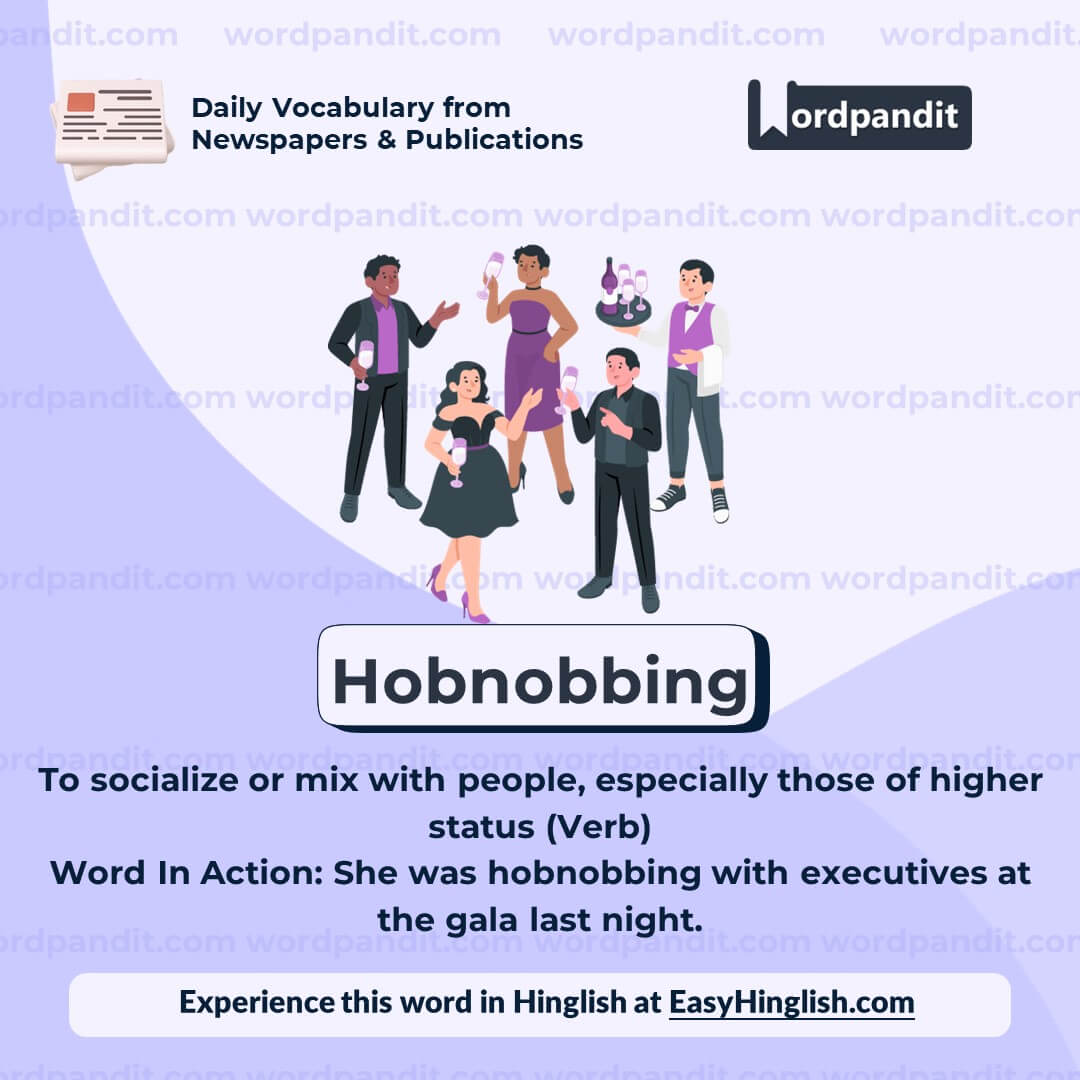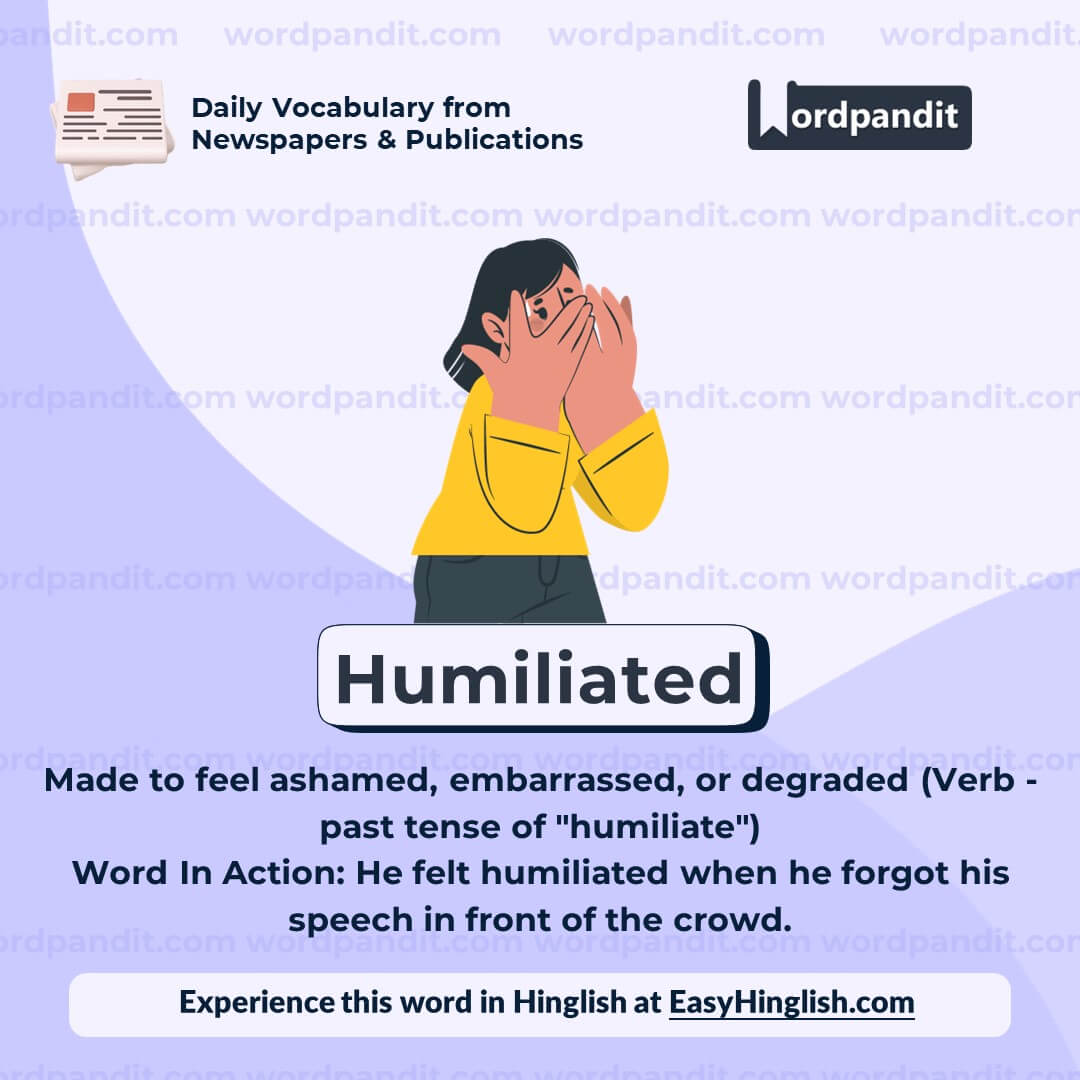Daily Vocabulary from Indian Newspapers and Publications
Welcome to Wordpandit’s Indian Vocabulary Hub
At Wordpandit, we understand the importance of staying rooted in the local context while expanding your language skills. This section focuses on enriching your vocabulary with words and phrases drawn from India’s leading newspapers and publications, ensuring you're learning vocabulary that is practical, relevant, and uniquely Indian.
Why Indian Sources Matter
We believe that the best way to master any language is by immersing yourself in local content. That’s why we carefully curate vocabulary from top Indian publications, including:
- The Hindu
- The Times of India
- The Economic Times
- Hindustan Times
- Live Mint
- The Indian Express
- And many others...
Stay Updated, Stay Relevant
With daily updates from Indian news sources, you’ll be consistently learning words that reflect the trends and shifts in Indian society and culture. Our focus is to provide vocabulary that enhances your understanding of the language in an Indian context.
How Wordpandit Supports Your Goals
Whether you’re preparing for exams, aiming to improve your professional communication, or simply want to stay connected with the latest Indian vocabulary, Wordpandit is here to guide you every step of the way.
Learn with a Practical Approach
Our interactive learning methodology includes real-world examples, engaging activities, and context-specific usage to ensure that every word becomes part of your active vocabulary.
Dive into Indian Vocabulary Today!
Why Choose Wordpandit?
Practical Learning: Focus on words you'll actually encounter in real-world reading, enhancing your comprehension and communication skills.
Diverse Content: From current affairs to scientific breakthroughs, our varied sources expose you to vocabulary across multiple domains.
Effortless Integration: Make Wordpandit a part of your daily routine. Just a few minutes each day can significantly boost your lexicon over time.
Your Path to Vocabulary Mastery
- Visit our Daily Vocabulary section regularly
- Explore new words and their usage in context
- Practice incorporating these words into your own writing and speech
- Track your progress as your vocabulary expands
Start Your Journey Today
Embark on your vocabulary enhancement journey with Wordpandit. By consistently engaging with our daily posts, you'll build a robust vocabulary that serves you well in academic, professional, and personal contexts.
Remember, a word a day keeps linguistic limitations at bay. Make Wordpandit your daily companion in the quest for vocabulary excellence!
WORD-1: Jubilation
Context:
"There was jubilation when he made history as the first Black president." - The Wire
Explanatory Paragraph:
Jubilation refers to a feeling of extreme happiness, joy, or celebration, often in response to a significant achievement or success. It is the kind of happiness that spreads among people when something wonderful happens, such as winning a championship, achieving a lifelong goal, or witnessing a historic moment.
Meaning: A feeling of great happiness and triumph (Noun)
Pronunciation: joo-buh-LAY-shun
Difficulty Level: ⭐⭐⭐ Intermediate
Etymology: Derived from the Latin word "jubilare," meaning "to shout for joy."
Synonyms & Antonyms:
Synonyms: elation, euphoria, exultation, joy, celebration
Antonyms: sorrow, despair, melancholy, disappointment
Usage Examples:
- The streets were filled with jubilation after the team's unexpected victory in the finals.
- Her face lit up with jubilation when she received the news of her scholarship.
- The nation erupted in jubilation when peace was finally declared after years of conflict.
- There was jubilation in the air as the couple announced the birth of their first child.
Cultural Reference:
"Jubilation swept across the country when Nelson Mandela was released from prison in 1990, marking the beginning of a new era in South African history." - Historical Archives
Think About It:
What moments in your life have filled you with jubilation, and why do you think those experiences stood out?
Quick Activity:
Write a short paragraph describing a time when you felt jubilation. Use vivid details to express the joy of the moment.
Memory Tip:
Think of 'jubilation' as 'jumping with joy'—both words start with 'ju' and convey excitement.
Real-World Application:
The word 'jubilation' is often used in news reports, literature, and speeches to describe mass celebrations, victories, and achievements. Whether it's a historic political event, a sports championship, or a personal accomplishment, this word perfectly captures the feeling of overwhelming joy.
WORD-2: Hobnobbing
Context:
"Whole islands and continents are settled through hobnobbing with one messenger while shooting the other." - The Wire
Explanatory Paragraph:
Hobnobbing refers to the act of socializing or mingling, often in an informal yet friendly way, usually with people of influence or power. The word is commonly associated with networking, where individuals engage in casual conversations that may lead to opportunities, alliances, or advantages.
Meaning: To socialize or mix with people, especially those of higher status (Verb)
Pronunciation: HOB-nob-ing
Difficulty Level: ⭐⭐⭐ Intermediate
Etymology: Originates from the 18th-century English phrase "hob and nob," meaning "to drink together."
Synonyms & Antonyms:
Synonyms: mingling, fraternizing, networking, socializing, schmoozing
Antonyms: avoiding, isolating, distancing, ignoring
Usage Examples:
- At the gala, he spent the evening hobnobbing with celebrities and business tycoons.
- She enjoys hobnobbing with influential leaders to expand her professional network.
- The journalist was accused of hobnobbing with politicians instead of maintaining impartiality.
- Tech entrepreneurs often hobnob at industry conferences to exchange ideas and form partnerships.
Cultural Reference:
"Hobnobbing with the elite has long been a strategy for gaining political and economic power. From royal courts to modern boardrooms, social connections often determine success." - Business Insider
Think About It:
Do you think hobnobbing is essential for success, or can talent and hard work alone be enough?
Quick Activity:
Write a dialogue between two people discussing the benefits and drawbacks of hobnobbing in the workplace.
Memory Tip:
Imagine two people "nobbing" their heads together as they gossip and network at a party—hobnobbing means socializing!
Real-World Application:
The term 'hobnobbing' is frequently used in political, business, and social contexts to describe informal networking. It highlights the importance of relationships in career advancement and decision-making.
WORD-3: Speculate
Context:
"In the face of such innocence, do we speculate that had, for instance, a brown man in a hoodie with ‘Palestine’ written across it repeatedly tried to hit a white woman – they’d know?" - The Wire
Explanatory Paragraph:
To speculate means to form an opinion or make a guess about something without having complete evidence or knowledge. It often involves considering possibilities, making predictions, or engaging in thoughtful conjecture about uncertain events or situations.
Meaning: To form a theory or conjecture without firm evidence (Verb)
Pronunciation: SPEK-yuh-layt
Difficulty Level: ⭐⭐⭐ Intermediate
Etymology: From Latin "speculari," meaning "to observe" or "to watch."
Synonyms & Antonyms:
Synonyms: hypothesize, guess, theorize, ponder, surmise
Antonyms: verify, prove, confirm, establish
Usage Examples:
- Economists speculate about the impact of artificial intelligence on the job market.
- Fans began to speculate whether the actor would return for the next season of the show.
- Many scientists speculate about the possibility of life on other planets.
- He refused to speculate on the reasons for his sudden resignation.
Cultural Reference:
"Stock market speculation has led to some of the biggest financial booms and crashes in history, including the Great Depression of 1929." - Economic Archives
Think About It:
When does speculation become harmful, and when can it be a useful tool for decision-making?
Quick Activity:
Think of a mystery or an unanswered question in history. Write a short paragraph speculating on a possible explanation.
Memory Tip:
Think of 'speculate' as 'spectacles for your mind'—it helps you look at possibilities, even if you don't have all the facts.
Real-World Application:
Speculation is commonly used in finance, journalism, and science. Investors speculate on market trends, journalists speculate on political outcomes, and scientists speculate about new discoveries before proving them.
WORD-4: Humiliated
Context:
"Do I share that generations of Muslims have been told to run from conflict, to 'just ignore it,' 'be silent,' 'lie low,' be 'stoic' even when humiliated, profiled and attacked?" - The Wire
Explanatory Paragraph:
To be humiliated means to feel deep shame, embarrassment, or a loss of dignity, often due to being insulted, degraded, or treated unfairly. It is an intense emotional response to situations where one's self-respect or pride is hurt, either in private or in front of others.
Meaning: Made to feel ashamed, embarrassed, or degraded (Verb - past tense of "humiliate")
Pronunciation: hyoo-MIL-ee-ay-ted
Difficulty Level: ⭐⭐⭐ Intermediate
Etymology: From the Latin "humiliare," meaning "to bring low" or "to humble."
Synonyms & Antonyms:
Synonyms: embarrassed, shamed, degraded, belittled, dishonored
Antonyms: respected, honored, praised, uplifted, dignified
Usage Examples:
- She felt humiliated when her mistake was pointed out in front of the entire class.
- After losing the match by a huge margin, the team was humiliated in the press.
- He was humiliated when his colleagues laughed at his presentation.
- The prisoner was humiliated by his captors as a form of psychological torment.
Cultural Reference:
"Throughout history, public humiliation has been used as a form of punishment, such as stocks in medieval times or modern-day social media shaming." - Historical Perspectives Journal
Think About It:
Can humiliation ever be a positive experience, leading to personal growth or change?
Quick Activity:
Write about a time when you or someone you know felt humiliated. How did they handle it?
Memory Tip:
Think of 'humiliated' as feeling 'humbled' in a painful way—both words come from the same root.
Real-World Application:
The concept of humiliation is often discussed in psychology, human rights, and history. Understanding how humiliation affects individuals and societies helps in fostering empathy and encouraging respectful interactions.
WORD-5: Racialized
Context:
"More widely, Islamophobia is the construction of 'Muslim' as a racialized category with narrative tropes built of fear, such as, the men are violent, the women are oppressed." - The Wire
Explanatory Paragraph:
Racialized refers to the process by which a group of people is categorized, perceived, or treated based on race, often in a way that reinforces stereotypes or social hierarchies. It is commonly used in discussions about social justice, discrimination, and identity politics.
Meaning: Treated or categorized in terms of race, often in a way that reinforces stereotypes (Verb - past participle of "racialize")
Pronunciation: RAY-shuh-lized
Difficulty Level: ⭐⭐⭐⭐ Advanced
Etymology: Derived from "race" (from Old French "razza") and the suffix "-ize," meaning "to make" or "to become."
Synonyms & Antonyms:
Synonyms: categorized, stereotyped, segregated, discriminated
Antonyms: neutralized, equalized, desegregated, deconstructed
Usage Examples:
- The debate highlighted how certain crimes are racialized in media coverage.
- Many social justice activists work to challenge racialized narratives in politics.
- The immigration policies were criticized for being racialized and discriminatory.
- In history, different immigrant groups have been racialized in ways that shaped their social status.
Cultural Reference:
"The concept of racialized identities has been explored in postcolonial literature, where authors discuss how racial perceptions shape power dynamics and social roles." - Postcolonial Studies Journal
Think About It:
How does racialization influence the way people are treated in society, and what steps can be taken to challenge it?
Quick Activity:
Reflect on a movie, book, or news article where a group was racialized. How did it impact the way they were portrayed?
Memory Tip:
Think of 'racialized' as 'race-alized'—where people are viewed or treated through the lens of race, even when it may not be relevant.
Real-World Application:
The concept of racialization is frequently discussed in sociology, law, and activism. Understanding how racialization works can help challenge biases and promote more equitable societies.



















